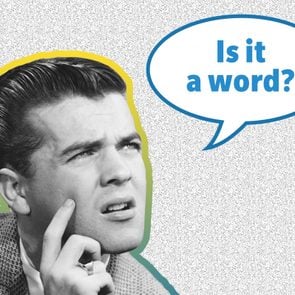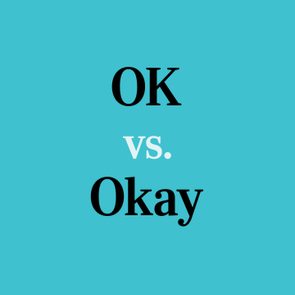What does literally mean? Once upon a time, the word had a single official definition. Truly and actually come close to this meaning; the original Merriam-Webster’s Dictionary definition was “in a literal sense or manner.” So if you were “literally dying” after an embarrassing encounter, well, you needed to see a doctor.
Somewhere along the way, things changed. People started to use it for emphasis or exaggeration—to mean “in spirit, but not really.” Merriam-Webster describes it as a way to emphasize a statement or description. When you hear, “He was so mad, his head was literally exploding,” you understand that—thankfully for everyone—though he was angry, his head remained in one piece.
Has literally joined the list of trendy words you don’t understand, words you’re using wrong or words that don’t mean what you think they do? Is it even edging toward the group of words that make you sound stupid? Fear not. We’ll help you figure out when and how to use it properly in various contexts. And with that under your belt, you can move on with confidence—perhaps tackling some fancy words that’ll make you sound smarter.
What does literally mean?
Literally comes from a similar-sounding Latin word: littera, which means “letter.” Considering that, what does the word literally mean? Well, the original meaning was “to the letter,” a phrase that means “precisely, with no variation.” This use was first recorded in 1429 in the Oxford English Dictionary.
That makes sense if you consider that the definition of literally is “in a literal manner.” And what does literal mean? Why, “according to the letter” and “free from exaggeration,” of course.
Over time, though, literally has taken on a different meaning. We can now use it to exaggerate or emphasize a point. “It’s so hot—I’m literally melting,” someone might say when temperatures climb. Fortunately, though they are somewhat uncomfortable, they are not really melting at all.
In essence, literally may have started as a precise statement of fact, but nearly six centuries later, it’s more often used in a nonliteral way. (What does nonliteral mean? Exactly what it sounds like: “not literal.”)
What is an example of the word literally as it was first used?
That’s easy. Any situation where you are stating exactly what is happening or what is true can use literally with its original meaning. If walking from your home to your workplace takes you five minutes, allowing you a wonderfully short commute, you can say, “My office is literally a five-minute walk from where I live.” If you’ve discovered an ice cream that bests all others you’ve tried, you can say, “This is literally the best ice cream I’ve ever had.”
Both these uses illustrate the original answer to the question “What does literally mean?”
This, at least, is straightforward. And that’s a relief, given how puzzling some other aspects of English can be—such as these common pairs of words everyone confuses.
Can literally ever mean figuratively?
These days, literally can actually have a meaning close to “figuratively.” Dictionaries such as Merriam-Webster, Cambridge and the Oxford English Dictionary include this definition, and the word is sometimes used this way in more informal speech and writing.
This meaning of literally could be described as “not really, but it feels that way.” Someone who’s exhausted but, for now, still awake might tell you, “I’m literally asleep in my chair.” A rock star’s No. 1 fan might proclaim a tune “literally the world’s best song,” knowing that others may prefer a different one. With this definition, literally joins the collection of words that mean their opposite.
Despite what you may think, this isn’t an ultra-modern use of literally. Classic authors such as Mark Twain, Charlotte Bronte and James Joyce have used the term figuratively. And linguists trace this use back to the 18th century. Charles Dickens even used literally this way in Nicholas Nickleby: “‘Lift him out,’ said Squeers, after he had literally feasted his eyes, in silence, upon the culprit.”
But this use seems to have gained popularity in spoken English in the past few decades—and as it turns out, not everyone is happy about it. Read on to learn about this linguistic controversy and situations in which you may not want to use literally with this meaning.
Is it OK to use literally figuratively?
Understanding the word literally isn’t as simple as answering the question “What does literally mean?” Though dictionaries support the word’s expanded meaning and use, many simply don’t accept it, except in the most informal of situations. The objection? Using a word in a way that means its opposite makes no sense, so why should this use of literally find its way into anything like a news report, a piece of professional writing or a job interview?
The expanded use of literally is often used for humor—and indeed, it can be funny. “So there I was,” you tell some buddies over an after-work cocktail, “holding up a fly-swatter to defend myself against an insect literally the size of my cat.” The exaggeration adds levity, and the group knows the insect didn’t truly rival your four-legged friend for size.
This use of literally is frequently (though not only) heard from younger people and could be considered part of Gen Z slang. But in serious or professional contexts—and this goes for both spoken and written language—literally should be used with its original “to the letter” meaning.
It can be tricky, we know. But if you keep in mind that the word should be used with its original meaning in contexts that are not casual or humorous, you’ll be fine. And we mean that literally.
Sources:
- Merriam-Webster: “Did We Change the Definition of ‘Literally’?”
- Cambridge Dictionary: “Literally”
The post What Does <i>Literally</i> Really Mean—and Are You Using It Incorrectly? appeared first on Reader's Digest.
from Reader's Digest https://ift.tt/gKLXr3t



Comments
Post a Comment